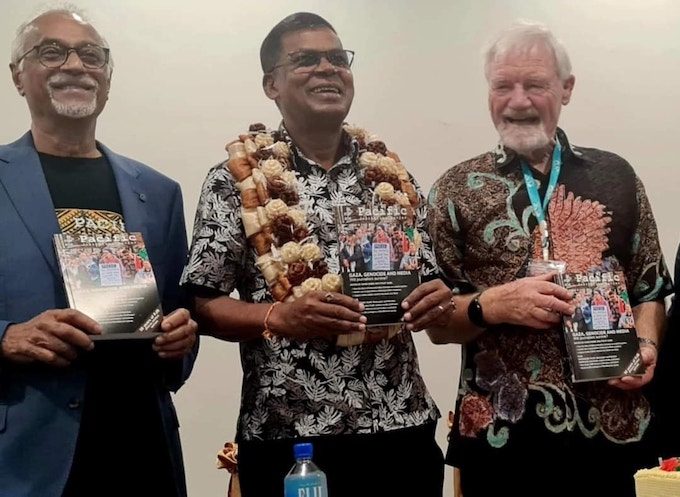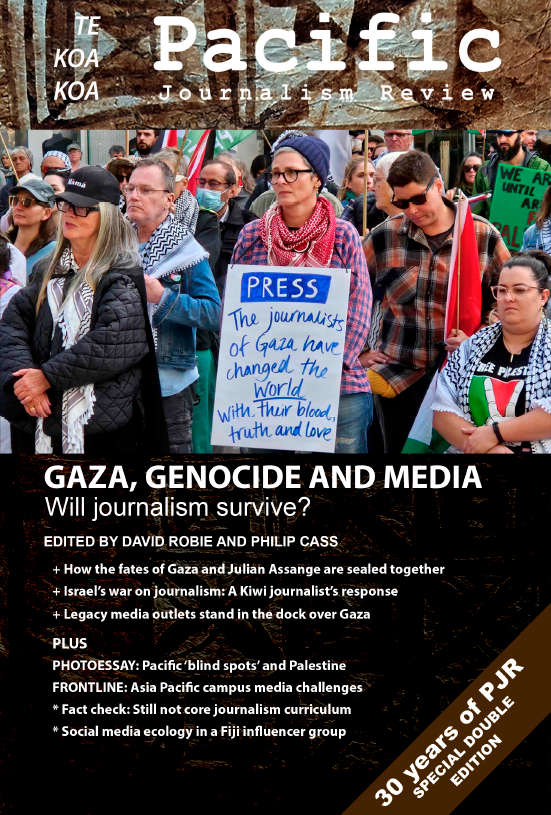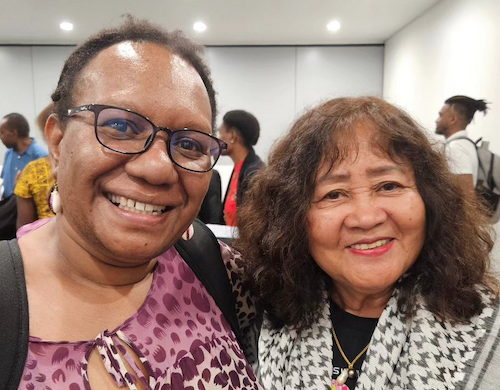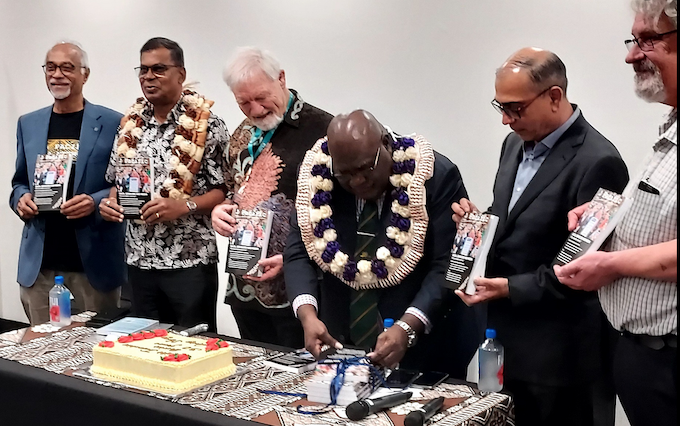Pacific Journalism Review turns 30 – and challenges media over Gaza

Pacific Journalism Review celebrates 30 years of publishing at the Pacific InternatIonal Media Conference in Fiji . . . Professor Vijay Naidu (from left), Fiji's Deputy Prime Minister Professor Biman Prasad and founding editor Dr David Robie. Image: Del Abcede/APMN
Pacific Journalism Review has challenged journalists to take a courageous and humanitarian stand over Israel’s genocidal war in Gaza in its latest edition with several articles about the state of news media credibility and the shocking death toll of Palestinian reporters.
It has also taken a stand in support of WikiLeaks founder Julian Assange who was set free in a US federal court in Saipan and returned to Australia the day before copies of the journal arrived back from the printers.
The journal went online last week and it celebrated three decades of publishing at the 2024 Pacific International Media Conference hosted by The University of the South Pacific in Fiji in partnership with the Pacific islands News Association (PINA) and the Asia Pacific Media Network (APMN).
In the editorial provocatively entitled “Will journalism survive?”, founding editor Dr David Robie wrote: “Gaza has become not just a metaphor for a terrible state of dystopia in parts of the world, it has also become an existential test for journalists — do we stand up for peace and justice and the right of a people to survive under the threat of ethnic cleansing and against genocide, or do we do nothing and remain silent in the face of genocide being carried out with impunity in front of our very eyes?
“The answer is simple surely.”
Launching the 30th anniversary edition, adjunct USP professor Vijay Naidu paid tribute to the long-term “commitment of PJR to justice and human rights” and noted USP’s contribution through hosting the journal for five years and also continued support from conference convenor associate professor Shailendra Singh.
Papua New Guinea’s Communication Minister Timothy Masiu also launched at the PJR event a new book, Waves of Change: Media, Peace, and Development in the Pacific, edited by Professor Biman Prasad (who is also Deputy Prime Minister of Fiji), Dr Singh and Dr Amit Sarwal.The PJR editors, Dr Philip Cass and Dr Robie, said the profession of journalism had since the covid pandemic been under grave threat and the journal outlined challenges facing the Pacific region.

The cover of the 30th anniversary edition of Pacific Journalism Review. Image: PJR
Among contributing writers, Jonathan Cook, examines the consequences of the International Court of Justice (ICJ) legal cases over Israel’s illegal occupation of the Palestinian territories, and Assange’s last-ditch appeal to prevent the United States extraditing him so that he could be locked away for the rest of his life.
Both cases pose globe-spanning threats to basic freedoms, writes Cook.
New Zealand writer Jeremy Rose offers a “Kiwi journalist’s response” to Israel’s war on journalism, noting that while global reports have tended to focus on the “horrendous and rapid” climb of civilian casualties to more than 38,000 — especially women and children — Gaza has also claimed the “worst death rate of journalists” in any war.
The journalist death toll has topped 158.
Independent journalist Mick Hall offers a compelling research indictment of the role of Western legacy media institutions, arguing that they too are in the metaphorical dock along with Israel in South Africa’s genocide case in the ICC.

PJR designer Del Abcede with Rosa Moiwend at the PJR celebrations. Image: David Robie/APMN
He also cites evidence of the wider credibility implications for mainstream media in the Oceania region.
Among other articles in this edition of PJR, a team led by RMIT’s Dr Alexandra Wake, president of the Journalism Education and Research Association of Australia (Jeraa), has critiqued the use of fact check systems, arguing these are vital tool boxes for journalists.
The edition also includes articles about the Kanaky New Caledonia decolonisation crisis reportage, three USP Frontline case study reports on political journalism, the social media ecology of an influencer group in Fiji, and a photo essay by Del Abcede on Palestinian protests and media in Australia, New Zealand and the Pacific.
Book reviews include the Reuters Journalism, Media, and Technology Trends and Predictions 2024, Journalists and Confidential Sources, The Palestine Laboratory and Return to Volcano Town.
The PJR began publication at the University of Papua New Guinea in 1994.
Postscript: On 2 August 2024, Australian National University's DevPolicy published a tribute to the journal's three decades of publishing Asia-Pacific media research.
• The full 30th anniversary edition of Pacific Journalism Review
• Pacific Journalism Review at 30: a strong media legacy - David Robie, DevPolicy

Celebrating the 30th anniversary of Pacific Journalism Review with a birthday cake . . . Professor Vijay Naidu (from left), Fiji Deputy Prime Minister Professor Biman Prasad, founding PJR editor Dr David Robie, PNG Communications Minister Timothy Masiu, conference convenor and PJR editorial board member Associate Professor Shailendra Singh, and current PJR editor Dr Philip Cass. Image: Joe Yaya/Islands Business











